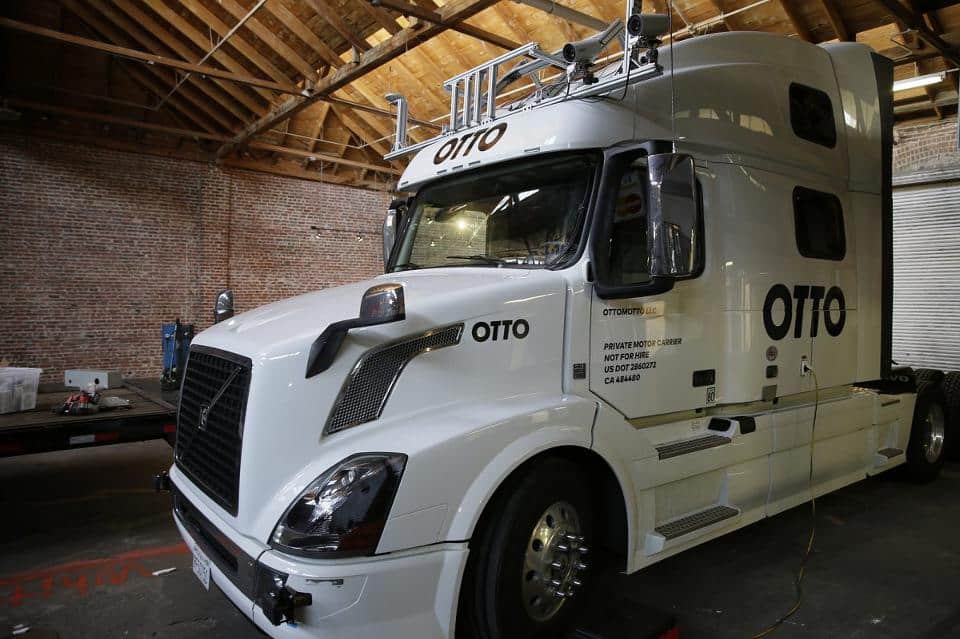
An Otto driverless truck at the Uber unit’s garage in San Francisco.
By Alan Ohnsman and Matt Drange
As Uber fights claims that it stole self-driving vehicle trade secrets from Alphabet Inc.’s Waymo, the rideshare giant quietly dropped the name for its driverless truck unit, “Otto.” The change was made last month in the wake of a trademark infringement dispute with a similarly named Canadian company that markets its own robotic vehicle technology.
Uber consolidated Otto’s activities under its Advanced Technologies Group, or Uber ATG, in April and “retired the Otto name,” it said without elaborating. The change came shortly after the dismissal of a trademark infringement suit brought by Kitchener, Ontario-based Otto Motors, a unit of Clearpath Robotics that makes autonomous vehicles for warehouses and industrial facilities.
The suit was dismissed without prejudice in February. Spokespeople for both Clearpath and Uber confirmed the dispute over the Otto name had been resolved. Neither confirmed details of any potential settlement. Since last month, the ot.to website has redirected visitors to the Uber ATG homepage.
“We are continuing to operate under the OTTO brand, whereas Uber has recently announced on its website that it is retiring the OTTO name,” Otto Motors spokeswoman Meghan Hennessey said in a written statement to Forbes.
Uber paid $680 million for the tiny startup Ottomotto LLC, or Otto, in August 2016 which at the time had 90 employees and little more than a plan to develop and sell hardware and software kits to convert semi-trucks to drive themselves. Its co-founder Anthony Levandowski is the former Google engineer at the center of Waymo’s lawsuit against Uber and Otto that’s inching toward a trial later this year in a U.S. District Court in San Francisco.
Also read: Bullfrog Gold Raises $816,000 Of Equity To Advance Its Nevada Gold Project
Uber recently informed officials at the California Department of Motor Vehicles of its decision. “Otto called us a few weeks ago and said they were changing their name,” DMV spokeswoman Jessica Gonzalez said, adding that the company did not inform officials of the trademark infringement dispute that preceded the change.
The DMV is reviewing whether Otto broke state law by operating automated trucks without permission. Otto contends that trucks tested in California with advanced safety technology are not operated without human control.
The name change was also news to David Kidd, a research scientist with the Insurance Institute for Highway Safety, an industry group that’s helping to shape nascent testing guidelines for self-driving vehicles in California and elsewhere. Kidd recently met with the Otto team, but said he was unaware of the unit’s new name until he was contacted by Forbes.
Prior to being purchased by Uber, Otto made a splash in May 2016 with video footage of a driverless Volvo semi rolling through Nevada. Otto drew even more attention in Oct. 2016 when it completed its first paid delivery, a shipment of Budweiser beer hauled through Colorado.
Waymo, created in December 2016 to commercialize Google’s self-driving vehicle system, sued Uber and Otto in late February, claiming Levandowski accessed an internal Google database and downloaded 14,000 technical documents. That occurred about six weeks before Levandowski resigned from Google, and then quickly created Otto.
Also see: Is this the end to banking as we know it?
Although the federal judge in that case has ordered Uber and Levandowski to return the stolen materials to Waymo, that hasn’t happened. Uber says it doesn’t have the documents and Levandowski refuses to comply with the order, citing his Fifth Amendment right against self incrimination. On Thursday, the judge overseeing the case took Levandowski to task for submitting essentially useless information related to the documents at issue. While neither Uber nor Waymo dispute that Levandowski took technical documents from Google, Uber said it hasn’t used this information in its own autonomous technology R&D efforts and doesn’t possess the data.
Separate from self-driving truck operations, Uber stepped into the commercial-hauling business this month the creation of Uber Freight, a platform to connect independent truck operators with trucking companies to arrange shipments in much the same way its rideshare platform connects drivers and passengers.
Though the Otto name was formally dropped in April, Uber told Forbes it retained “Ottomotto LLC” for its carrier operations. The change was visible on the side of a pair of semis parked on Thursday at the Uber ATG San Francisco lot, formerly Otto’s headquarters.

Matt Drange/Forbes An Uber ATG truck, parked outside the unit’s garage in San Francisco on May 25, 2017.
